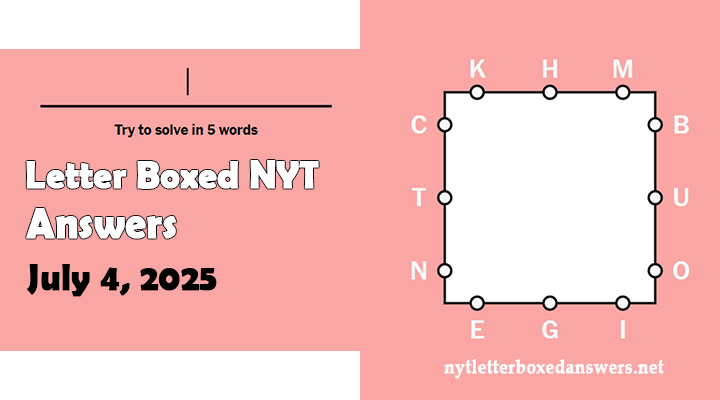NYT Letter Boxed quiz for Friday July 4, 2025 is released. We came up with Letter Boxed July 4 2025 Answers and Hints for you. With the help of these hints, you will be able to guess the words of letter boxed quiz without revealing the answers and get the solution.
| Top | Right | Bottom | Left |
|---|---|---|---|
| KHM | BUO | EGI | CTN |
| Two Words Solution | ||
|---|---|---|
| BEHEMOTHIC | CHUCKING | |
| BEHEMOTHIC | CHUNGKING | |
| BEHEMOTHIC | CHUNKING | |
| BEHEMOTHIC | CUCKING | |
| Three Words Solution | ||
|---|---|---|
| BECK | KNOT | THUMBING |
| BECKING | GNOMIC | CHUTING |

Word 01:
This 10-letter word starts with B and ends with C; describes something enormous and monstrous in scale or power.
Adjective form of “behemoth.”
Suggests vastness, might, or unwieldiness.
Often used metaphorically for large institutions.
May describe creatures, machines, or systems.
Conveys a sense of overwhelming size or force.
Implies something that’s difficult to control or manage.
Common in fantasy, sci-fi, or criticism of bureaucracy.
Derived from Biblical references.
Could refer to monstrous architecture or ideology.
Word 02:
This 8-letter word starts with C and ends with G; a colloquial term for throwing or tossing something carelessly.
Informal synonym of “hurling” or “flinging.”
Often paired with “out” or “in.”
Can describe playful or angry motions.
Used in sports, slang, or casual speech.
May suggest expelling or discarding.
Sound-related to “chuckling” but different in meaning.
Also means abandoning something abruptly.
Rooted in Middle English “chukken.”
Example: “He’s chucking rocks into the lake.”
Word 01:
This 10-letter word starts with B and ends with C; describes something enormous and monstrous in scale or power.
Adjective form of “behemoth.”
Suggests vastness, might, or unwieldiness.
Often used metaphorically for large institutions.
May describe creatures, machines, or systems.
Conveys a sense of overwhelming size or force.
Implies something that’s difficult to control or manage.
Common in fantasy, sci-fi, or criticism of bureaucracy.
Derived from Biblical references.
Could refer to monstrous architecture or ideology.
Word 02:
This 9-letter word starts with C and ends with G; former English name for Chongqing, a major city in China.
Once capital of China during WWII.
Located in southwestern China.
Known for spicy hotpot and steep hills.
Important political and industrial hub.
Located at confluence of Yangtze and Jialing rivers.
Transliterated differently under pinyin.
One of China’s four direct-controlled municipalities.
Significant in wartime history and diplomacy.
Modern name: Chongqing.
Word 01:
This 10-letter word starts with B and ends with C; describes something enormous and monstrous in scale or power.
Adjective form of “behemoth.”
Suggests vastness, might, or unwieldiness.
Often used metaphorically for large institutions.
May describe creatures, machines, or systems.
Conveys a sense of overwhelming size or force.
Implies something that’s difficult to control or manage.
Common in fantasy, sci-fi, or criticism of bureaucracy.
Derived from Biblical references.
Could refer to monstrous architecture or ideology.
Word 02:
This 8-letter word starts with C and ends with G; cognitive process of grouping information for easier memory.
Used in psychology and learning techniques.
Common in memory training or test prep.
Breaks long data into digestible “chunks.”
Applies to numbers, words, or tasks.
Example: remembering a phone number in segments.
Can also refer to cutting into large pieces.
Used in reading strategies and programming.
Enhances working memory performance.
Based on George Miller’s “magical number 7.”
Word 01:
This 10-letter word starts with B and ends with C; describes something enormous and monstrous in scale or power.
Adjective form of “behemoth.”
Suggests vastness, might, or unwieldiness.
Often used metaphorically for large institutions.
May describe creatures, machines, or systems.
Conveys a sense of overwhelming size or force.
Implies something that’s difficult to control or manage.
Common in fantasy, sci-fi, or criticism of bureaucracy.
Derived from Biblical references.
Could refer to monstrous architecture or ideology.
Word 02:
This 7-letter word starts with C and ends with G; archaic or dialectal variant with several interpretations, including possible association with public shaming.
Related to “cucking stool,” a medieval punishment device.
Historically used for women accused of scolding.
Symbol of public humiliation and control.
Part of outdated legal punishments in Europe.
Can also be misread as modern slang variants.
Rarely used in contemporary writing.
Appears in medieval literature or legal texts.
Rooted in “cuck,” meaning to mock or shame.
Often confused with similar modern insults.
Word 01:
This 4-letter word starts with B and ends with K; means a small stream or to gesture with a nod or motion.
Common in Northern England dialects.
“At your beck and call” is a famous phrase.
Also a surname and stage name of a musician.
Synonym of brook or creek.
Gesture to summon or direct.
Old Norse root: bekkr.
Seen in poetry and regional English.
Can refer to obedience or attention.
Tiny watercourse found in rural settings.
Word 02:
This 4-letter word starts with K and ends with T; a fastening made by tying a piece of rope, string, or thread.
Used in sailing, climbing, and gift-wrapping.
Symbol of unity or entanglement.
Also a unit of speed at sea or in the air.
May refer to difficulty or complexity.
Featured in idioms: “tie the knot,” “knot in the stomach.”
Appears in mathematics and decorative art.
Can be physical or metaphorical.
Requires looping and pulling techniques.
Ancient and essential skill in many crafts.
Word 03:
This 8-letter word starts with T and ends with G; using the thumb, often repeatedly or forcefully.
Can describe flipping pages quickly.
May also refer to hitchhiking gestures.
Related to pressing buttons or smartphone use.
Sometimes used to describe manual damage (e.g., “thumbed copy”).
Verb form of “thumb.”
Indicates tactile interaction or impatience.
Can be done on keypads or guitar strings.
Common in modern texting culture.
Implies a quick, low-effort motion.
Word 01:
This 7-letter word starts with B and ends with G; a rare or archaic form meaning to beckon or summon.
Related to the verb “beck.”
Could describe signaling someone silently.
Appears in older poetry or prose.
Not common in modern dictionaries.
May involve head nods or hand gestures.
Used in historical or fantasy settings.
Evokes manners, royalty, or servitude.
Comparable to “motioning” or “gesturing.”
Derived from same root as “beckon.”
Word 02:
This 6-letter word starts with G and ends with C; describes short, wise, and often cryptic sayings.
Related to aphorisms or proverbs.
Suggests pithy philosophical insight.
Common in classical literature and poetry.
From Greek gnomē (judgment or opinion).
Often timeless and broadly applicable.
Seen in moral or didactic writing.
Opposite of rambling or verbose.
Could describe style or tone of verse.
Suited to fortune-cookie wisdom or ancient texts.
Word 03:
This 7-letter word starts with C and ends with G; refers to descending by parachute or using a chute.
Derived from “parachuting.”
Common in skydiving or airborne operations.
May refer to guiding something through a chute.
Verb form related to motion and descent.
Used in military, sport, or logistics.
Could describe evacuation or emergency protocols.
Informal variant in some action sports.
Used metaphorically for sudden drops.
Not widely used outside specialized contexts.

Chris Brown is a passionate word game love and problem solving expert. With over 15 years of experience in solving puzzle challenges, he provides daily NYT Letter Boxed answers, tips and strategies to help other players so that they can improve their solving skills. Whether you are stuck on a tricky puzzle or looking for new techniques, Chris is here to guide you with his expert solutions.